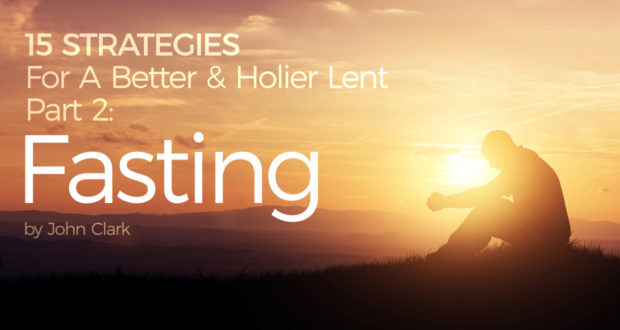This is the second in a three-part series on the Lenten practices of almsgiving, fasting, and prayer.
When it comes to the three-fold Lenten calling of almsgiving, prayer, and fasting, it is fasting that often proves the most difficult. Prayer is something we Catholics do (or should do) every day, and almsgiving is something we often do habitually.
But among the three, fasting is the thing we probably do the least, and the thing we might try the hardest to avoid.
In our American culture, we are inundated with advertisements for food and beverages. We are constantly surrounded by enticements that please the palate. Denying ourselves these culinary pleasures tends to make us slightly miserable, mainly because we hate realizing and accepting the fact that food is so darned important in our lives.
However, difficult as it is, our Faith teaches us that fasting has strong and unique benefits. Fasting has been recognized as virtuous since the dawn of salvific history in the Old Testament, and in the New Testament, the spiritual case was strengthened.
Jesus Himself fasted for 40 days, thus illustrating to us that fasting is a powerful way too, to fight against temptation. In a startling account in the Gospel of Mark, the Apostles attempt to cast out a devil that had been afflicting a child. However, they are unable to do so.
After Jesus cast the devil out, the Apostles wonder why they had been unsuccessful with their exorcism. Recounted in Mark 9:29, Jesus answers their question, informing them that some kind of devils can be cast out only “by prayer and fasting.”
We live in a world seemingly overcome by evil, and we often wonder why. Jesus gave us that answer two thousand years ago: Because some devils can be cast out only by prayer and fasting.
Too few of us are praying.
Far too few of us are fasting.
The doctors of the Church were unreserved about the value of fasting. For instance, St. Augustine wrote:
“Fasting cleanses the soul, raises the mind, subjects one’s flesh to the spirit, renders the heart contrite and humble, scatters the clouds of concupiscence, quenches the fire of lust, (and) kindles the true light of chastity.”
Insofar as we are able, we need to re-consider the great good of fasting. As a way of inspiring ourselves to fast this Lent, let’s consider five reasons for fasting.
1. Fast for Your Children.
Our modern world, with its casual rejection of morality, is a difficult one in which to mature. Our children need not only our prayers, but our fasting. When we fast, we can say a short prayer like:
“Dear Jesus, through this fast, please help my children grow closer to Your Sacred Heart.”
2. Fast for Your Parents.
We have a duty to pray for our parents, but how many of us consider fasting for them?
As they grow older and face the challenges of older age, we can fast with the intention that they can well-endure the new difficulties they face.
3. Fast for your Parish Priest.
Our parish priests hear our confessions, baptize our babies, and pray for us incessantly.
Who on earth is more deserving of a fasting intention than our priests?
4. Fast for the Souls in Purgatory.
Those of us on earth have a duty to help those suffering souls in Purgatory. What better gift can we give them than fasting, to help free them from their suffering?
It is said that when we help a soul in Purgatory get into heaven with our actions, he or she prays for us until we get to Heaven. That sounds like a pretty good deal.
5. Fast to Overcome a Particular Sin.
Like weeds in a beautiful garden, some sins seem to just keep arising in our lives. Perhaps especially for men, it is the temptations of the flesh that keep cropping up. Some men have tried various methods for purity, but still feel at a loss.
It’s worth remembering that St. Thomas Aquinas wrote that “Fasting is the guardian of chastity.” A weekly fast might be part of the solution to this problem. And it doesn’t have to be sins of the sixth and ninth commandments that fasting can address.
As St. Thomas and St. Augustine observed, fasting can help counter any sin.
Let’s make this the Lent that we see the good of fasting, so that we may understand the joy that comes from placing more emphasis on spiritual goods than on material ones.
May we begin to understand that a Heavenly banquet awaits those who keep the Fast, a banquet held in the presence of Our Resurrected Lord.
Prayer Image © kevron2001 / Dollar Photo Club

 Seton Magazine Catholic Homeschool Articles, Advice & Resources
Seton Magazine Catholic Homeschool Articles, Advice & Resources
